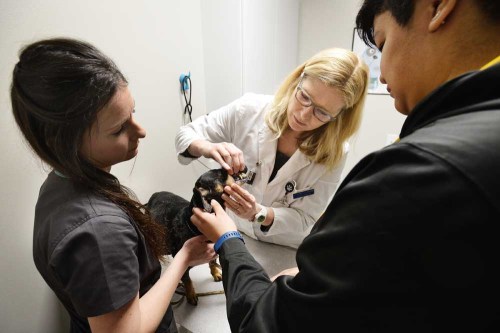Canine influenza found in Walla Walla
Published 1:01 pm Friday, March 2, 2018

- Veterinarian Fiona Hillenbrand, center, checks the dental health of a dog on January 24 at the Pendleton Veterinary Clinic.
Now is a good time to keep an even closer eye on your dog’s health, as a case of canine influenza was recently confirmed in the area. The virus, which has two strains — H3N8 and H3N2 — was recently found in a dog in Walla Walla. Some local veterinary clinics have already been taking precautions against the virus.
“I’ve informed local daycares and groomers,” said Dr. Fiona Hillenbrand, a veterinarian at Pendleton Veterinary Clinic. “We’ve been vaccinating against the virus since January 2016.”
Hillenbrand said dogs have to be vaccinated twice, with one dosage administered three or four weeks after the first. They don’t get full immunity until a week to 10 days after the second injection.
“Full immunity has a 95 percent protection rate,” she said.
Hillenbrand said the virus may have originated somewhere on the East Coast, but there has been a fairly large outbreak in the San Francisco area.
“A lot of daycare and boarding facilities are closing down,” she said.
Hillenbrand said they have had lots of people calling, concerned that their dogs are at risk.
“Some of them are already up to date,” she said. “Right now, the population of pets are at risk when they’re in contact with other animals — boarding, dog parks.”
Not all local vet clinics are concerned. A representative for Hermiston Veterinary Clinic said they are not currently vaccinating for canine influenza, and that the veterinarians there have no immediate plans to do so.
Hillenbrand said symptoms include a cough, followed by fever and ocular or nasal discharge.
“They’re just sick,” she said. “Lethargic. Very similar to the human flu.”
If a dog does contract the virus, Hillenbrand said there is supported treatment, and that most dogs are OK if they receive treatment. But she said there is a five to 10 percent death rate for dogs who are infected with the virus.
“It doesn’t discriminate between the young and very old,” she said. “Dogs already have compromised lung functions.”
Though they already vaccinate for the virus, Hillenbrand said the veterinary clinic takes extra precautions. If someone comes in with a sick dog, they are asked to keep the dog in the car. They have to bring the dog in through a separate entrance.
“They’re completely isolated. There’s a very strict protocol,” she said.
Hillenbrand said the virus usually doesn’t survive more than 48 hours on inanimate objects. Dogs who test positive for the virus have to be isolated for 21 days, she said. They are most contagious during the two to four-day incubation period of the virus.
———
An earlier version of this article incorrectly identified the protection rate of immunizations.





